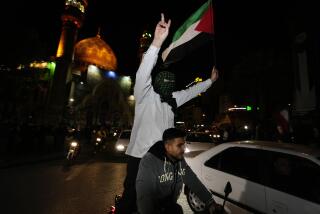Iraq says raid on militant group’s camp wasn’t Iran’s idea
The Iraqi government Wednesday rejected suggestions that Iranian pressure had prompted a raid on a camp belonging to an Iranian opposition group, saying that Iraqi security forces were merely seeking to extend sovereignty over all Iraqi territory.
The Mujahedin Khalq, a militant group that has long opposed the Iranian government, said seven of its members had died in clashes with Iraqi security forces after Iraqi police attempted to enter its camp in Diyala province Tuesday to open a police station.
A police official in Diyala said Iraqi forces had established control over a portion of the camp Wednesday, but were encountering resistance from Mujahedin Khalq members who had lain on the ground to prevent police advancing.
“The Iraqi government is determined to establish its sovereignty over all positions and facilities that were under the control of foreign forces,” government spokesman Ali Dabbagh told reporters. “The government wants to open an Iraqi police station inside the camp to impose the rule of law and establish the rule of the state.”
Dabbagh said Iranian citizens in the camp would not be forced to return to Iran, where they fear they would be punished.
Camp Ashraf, as the facility is known, illustrates the complex relationship that has emerged between Iraq and its two biggest allies, the U.S. and Iran. The camp dates back to the 1980s, when Saddam Hussein invited the Mujahedin Khalq to establish a presence in Iraq during the Iran-Iraq war.
The U.S. military inherited control of Camp Ashraf after the 2003 U.S.-led invasion of Iraq, in which Hussein was ousted, and U.S. forces disarmed the group. Though Washington brands the Mujahedin Khalq a terrorist organization, it has also protected the perimeter of the camp and has argued against the forcible deportation of its 3,500 residents to Iran, where they would almost certainly face persecution.
With implementation of December’s security agreement between the U.S. and Iraq, Iraqi forces assumed control of the camp’s perimeter and they have for months been threatening to take control of the camp itself. Iraq, meanwhile, has come under intense pressure from neighboring Iran to close the camp, from which residents are accused of carrying out acts of terrorism in Iran.
The Mujahedin Khalq says it has not carried out any acts of violence since 2002.
Iranian parliament speaker Ali Larijani praised the raid. “This action by Iraq came late, but it is laudable that they decided to clear the country of terrorists,” he was quoted as saying by the Fars news agency.
The Mujahedin Khalq quoted the group’s leader, Maryam Rajavi, who lives in Paris, as saying that “the attack was carried out at the behest of the Iranian regime.” But Iraqi officials contended that Iranian pressure had played no role.
“This is an Iraqi operation on Iraqi land. . . . Our forces have the right to enter any place inside our country,” said Defense Ministry spokesman Mohammed Askari.
The pledge to assert the right of Iraqi forces to extend their authority over all of Iraq has potentially profound implications for another simmering dispute, over territories claimed by the northern semiautonomous region of Kurdistan and currently controlled by Kurdish peshmerga forces.
The peshmerga have prevented Iraqi security forces from entering their territory on at least three occasions since May, and U.S. commanders have identified the dispute as the biggest single threat to Iraq’s stability.
On Wednesday, U.S. Defense Secretary Robert M. Gates visited Kurdistan to meet with Kurdish leader Massoud Barzani, who has just won reelection to the presidency of the region. Gates urged him to work with Baghdad to find a solution to the disputes before American troops finish withdrawing from Iraq, and said the U.S. would be willing to mediate.
Gates told reporters that the exit of U.S. troops from Iraq’s cities had gone better than expected, and said it might be possible to speed up the withdrawal of some U.S. forces.
Combat troops are to go home by August 2010, and all U.S. forces are scheduled to be withdrawn by the end of 2011.
“I think there’s at least some chance of a modest acceleration,” the Associated Press quoted him as saying aboard his plane on the journey back to Washington. A combat brigade of 5,000 troops could be brought home, Gates said.
--
Times staff writers Raheem Salman and Saif Hameed and a special correspondent in Diyala contributed to this report.
More to Read
Start your day right
Sign up for Essential California for news, features and recommendations from the L.A. Times and beyond in your inbox six days a week.
You may occasionally receive promotional content from the Los Angeles Times.






